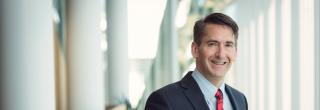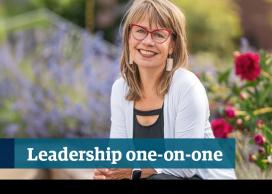Dr. James Olson is the Dean of the Faculty of Applied Science, and a professor of Mechanical Engineering. He was the past Associate Dean of Research and Industry Partnerships, Director of UBC’s Pulp and Paper Centre, and is an internationally recognized forest products researcher who has been actively involved in the transformation of the forest sector into a vibrant, diversified bio-products industry.
Q1. What quality do you most admire in a leader?
JO: There is what I consider a baseline of good leadership, which includes honesty, integrity and transparency. You cannot be a leader if you don’t possess these qualities. Beyond that, I have always admired the ability to motivate people and create a sense of community. I have tried to create that sense of community in the Faculty. To create a community of practice, including both industry and academic partners.
Q2. What makes you laugh?
JO: My children are hilarious. They have always made me laugh, at every stage of their lives.
Q3. Who inspires you, and why?
JO: The people who really inspire me are the students in the Faculty and UBC as a whole. Our students are academically brilliant and excel in extremely difficult programs. Many of them also excel outside the classroom, as brilliant athletes, concert pianists or community volunteers. I find them to be amazing — to be able to excel at so many things at the same time.
Q4. For you, what makes UBC different?
JO: Being situated on the west coast of Canada makes UBC special and instills an inherent entrepreneurial spirit, as well as a strong environmental ethos. In addition to this, UBC is its own small municipality, which allows us to create our own ‘sandbox’ for developing smart, sustainable, green city technology and policy. For our students and faculty within Applied Science, this means we are ideally placed to lead the way in developing new ways to focus on the human-centred, built environment.
Q5. What is the most important lesson you’ve learned, in your career to date?
JO: I would say that the lesson I have learned is: “It’s more about the journey than the destination”. You cannot invest everything in the end game. You have to enjoy and celebrate the progress at every step, as you never know for certain how things will turn out.
Q6. How do you like to recharge?
JO: There is a particular spot on Shuswap Lake that I love to spend time at with my family and friends. It is way out in the woods with no electricity or Wi-Fi. It’s a fantastic place to read a book, think and recharge.
Q7. What is the best advice you were ever given?
JO: The outgoing Dean gave me some advice. He said: “Don’t let the things that you can’t change drive you crazy.” And he was right. Some things you can work on and other things are simply outside of your control. It is important not to lose sleep over the things you cannot change.
Q8. What do you value in your colleagues?
JO: Enthusiasm and innovation. Enthusiasm in the sense of wanting to get things done, being ready to ‘grab the shovel and dig’. Innovation means being open to trying new things. Being willing to take a chance.
Q9. If you could have a super power, what would it be?
JO: Over the years I have had the chance to look at where we are scientifically and it has shown me how little we really know in terms of human health, genomics, artificial intelligence, molecular engineering, etc. I would love the ability to look into the future and see how we develop as a human race.
Q10. In your opinion, what potential does the Faculty of Applied Science still hold?
JO: The built environment covers almost everything. Just about every object people use in their everyday lives has been mined or engineered. It extends to transportation, communication, energy, safe water and buildings (to name a few).
The Faculty of Applied Science has the potential to impact almost all the grand challenges facing society today, from climate change and health care, to economic development and creating safe, liveable cities. For us, the potential is endless!
Q11. What do you hope to achieve in the Faculty, in the next three years?
JO: I would like to better integrate our various disciplines — architecture and landscape architecture, community and regional planning, engineering and nursing. We are already exploring the synergies between some of our disciplines. For example, we have created the Master of Engineering Leadership (MEL) degrees, where each degree combines multiple disciplines such as the MEL in Urban Systems for engineers and planners, or the MEL in High Performance Buildings for engineers and architects. We are also looking at ways to further integrate the Faculty across UBC’s two campuses, in Vancouver and the Okanagan.
Entrepreneurship is a priority for the next few years — building new programs that will inspire and support entrepreneurial thinking in our students, staff and faculty. I also want to continue to increase and expand engineering education in BC. In comparison to peer provinces, we are lagging, so there is plenty of work to be done to increase the number of engineering graduates in British Columbia.
Published: October 1, 2018
Interviewed by: Kate Hunter, UBC Internal Communications



